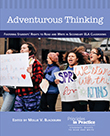These tips were contributed by NCTE member Mollie Blackburn, author of the recent NCTE book, Adventurous Thinking: Fostering Students’ Rights to Read and Write in Secondary ELA Classrooms. Her Council Chronicle essay “Students’ Rights to Read and Write and the Art of Revolutionary Teaching” appears in the September issue.
What are your words of wisdom to teachers for how to include texts with difficult topics in their classrooms?
One tip is to be prepared with the texts that you’re teaching. Know when you’re getting to the parts that are going to be difficult. Prepare students for that work. It might just be [saying], “this is a conversation that we’re about to have. I think you’re mature enough to handle it. It might make you feel uncomfortable in some ways, but we can work through that together.”
Or it might mean gathering information, knowing the norms of the community being represented, or knowing the history behind the event that happens. It’s knowing the text well and having the background knowledge, but also preparing your students for the conversations you’re going to have.
I would also [emphasize] the importance of getting support from administrators and parents before you engage students in that text so that they have your back.
What advice can you offer teachers who are nervous about engaging in this kind of work?
Ideally you’d be in a community of teachers who can offer support, so if you can find like-mind colleagues—whether in your school or your district or even nationally—that working and talking with people about how they’ve dealt with conflict, how they’ve engaged administrators and family members around the issues that you’re teaching students, that’s a great way to go.
if you are working more independently, if you’re not able to find a network of support, then I encourage you to keep administrators and parents informed about the work that you’re doing and explain what you’re trying to do. I find that generally when you’re in conversation with people they can be more understanding about [your efforts.]

Mollie Blackburn is a professor in the Department of Teaching and Learning at the Ohio State University. She is the author of Interrupting Hate: Homophobia in Schools and what Literacy Can Do about It, in addition to many other publications.


